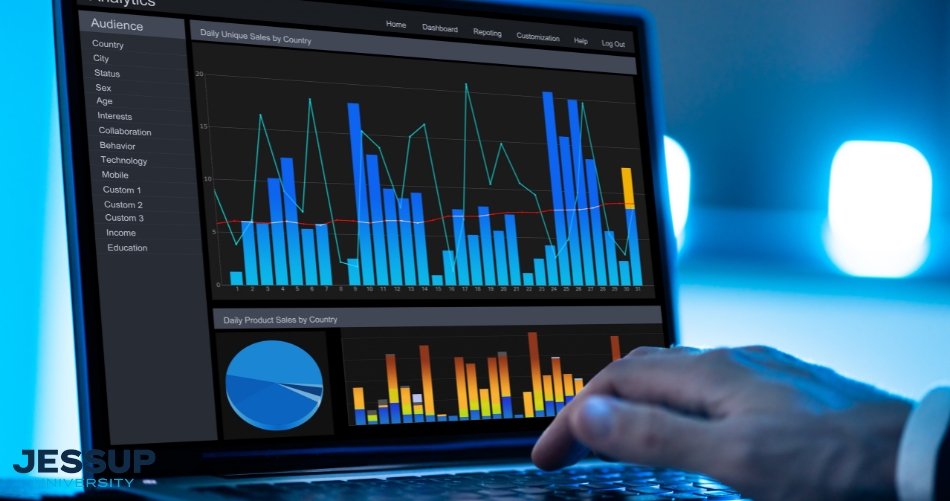
The Top Data Analytics Trends That Will Dominate 2024
The world of data analytics is rapidly evolving. As organizations realize the immense value that lies hidden in their data, they are adopting more advanced analytics techniques and solutions. The year 2024 promises to bring even more exciting innovations that will transform how companies extract actionable insights and make data-driven decisions.
In this guide, we explore the major data and analytics trends that are likely to dominate the industry landscape in 2024 and beyond. If you’re looking for a future career that involves all the latest tech, data analytics is sure to deliver on excitement.
The Rise of Artificial Intelligence in Data Analytics
One of the biggest trends in data analytics is the integration of artificial intelligence (AI) and automation. The use of machine learning (ML) algorithms allows companies to uncover patterns and derive meaningful conclusions from huge troves of data far quicker than what is humanly possible.
Some key developments in this area:
- Augmented Analytics: Solutions that combine natural language processing (NLP) capabilities and automated ML to speed up data preparation, visualization, and analytics. This allows business users without technical skills to easily analyze data and share impactful insights.
- Automated Machine Learning (AutoML): Platforms with inbuilt ML/AI that can automatically test different models and algorithms to deliver optimized analytics solutions without intensive coding or data science expertise.
- Generative AI: New techniques like generative adversarial networks that can produce synthetic yet realistic data to augment analytics and train ML models.
However, as the use of AI grows, issues around responsible AI, ethics, and algorithmic bias are also coming to the forefront. Organizations need to pay special attention to ensuring transparency, reliability and fairness from their AI systems. Proper checkpoints for quality assurance, testing and compliance need to be built into AI implementations. Will data analytics be automated any time soon? No, but automation assistance is something every aspiring data analyst needs to make sure to learn.
The Surge of Real-Time Stream Analytics

The proliferation of smart devices and sensors has created a deluge of continuously streaming data. Traditional analytics systems based on batch processing are unable to handle this real-time, high-velocity data. Hence, real-time stream analytics is witnessing massive adoption across sectors like telecom, banking, transport, logistics etc. where instant decision making is crucial.
Key drivers of streaming analytics:
- Edge Computing: Enables data to be processed at the source of origin for reduced latency. Vital for use cases like fraud detection or equipment fault diagnosis.
- Apache Spark: Open-source framework purpose built for large scale stream processing, integrates with popular languages like Python, R and Scala.
- Kafka: Leading open-source event streaming platform used by thousands of companies including Uber, Netflix, Cisco etc. Allows real-time data pipelines and streaming analytics applications.
The Growing Importance Of Data Governance
With businesses becoming extremely data dependent, priorities are shifting towards data governance i.e. managing the reliability, quality and security of data through its full lifecycle.
Salient aspects include:
- Data Observability: Tools to monitor data pipelines, flag anomalies, get lineage and context around metrics.
- Metadata management: Using metadata to maintain visibility into data authenticity across disparate sources and systems.
- Regulations: More consumer privacy laws like CCPA and GDPR necessitate governance frameworks for compliance.
Implementing robust data governance procedures is vital for trustworthy analytics and responsible data usage especially when employing techniques like AI.
The Shift Towards Cloud-Native Data Platforms

The scalability and flexibility demands of big data analytics combined with the need for enterprise-grade performance, security and governance has fueled the adoption of cloud-native data platforms:
- Data Lakes: Provide unlimited storage for both structured and unstructured data while data lakehouse architectures add in capabilities like management, transformation and querying.
- Cloud Data Warehouses: Offer on-demand expansion and built-in HA, DR for analytics workloads. Snowflake has been a gamechanger with its unique cloud-agnostic architecture.
- DaaS Offerings: Allow even smaller organizations to leverage analytics-ready datasets without infrastructure overheads.
As hybrid/multi-cloud deployments gain prominence, using cloud-based data platforms greatly simplifies analytics pipelines while providing unified data delivery leveraging services from all leading public cloud providers.
Improved Efficiency via DataOps
The combination of proliferating data sources, need for rapid analytics-based decision making and constrained IT budgets is driving investments towards optimizing and modernizing data infrastructure. DataOps movement focuses on enhancing collaboration between data engineers, analysts and end-users while leveraging automation to create leaner, scalable data pipelines.
Strategies being employed:
- In-Memory Databases: Deliver faster analytic query response times while slashing infrastructure costs. Help scale out workloads by up to 8000x compared to disk-based systems.
- Polyglot Persistence: Hand-off data processing between specialized data stores like timeseries DBs, graph DBs etc. based on workload patterns.
- Serverless architectures: Run data tasks in ephemeral, auto-scaling environments paying only for what you use. Greatly reduces resource over-provisioning.
DataOps practices enhance business agility, ROI and speed to insight for modern data platforms while ensuring governance, reliability and security of data.
Data Teams Adopting Software Engineering Mindset
To deliver better data products faster, analytics groups are transitioning towards data team as software team model – adopting best practices from software development lifecycle:
- Agile: Embracing iterative delivery, incremental improvements and rapid feedback cycles.
- CI/CD Pipelines: Automating testing, validation checks and promoting changes through dev, test and prod environments.
- Version Control: Tracking changes to data models, metrics, reports etc ensuring reproducibility and auditability.
- Ticketing workflows: Managing tasks and user stories through entire data lifecycle.
Some other parallels include adopting data mesh architecture where domain-oriented data products get created for consumption across the organization. Using data contracts to establish reliability and quality guarantees between data producers and consumers.
This shift accelerates value creation from analytics through reliable, repeatable and scalable data product delivery made possible by utilizing established software engineering toolbox.
Want To Learn Computer Science From Home?
Jessup University’s Unique Online BS in Computer Science Can Make It Happen!
Looking Ahead in 2024
Key strategic themes that emerge for enterprises seeking to leverage data analytics trends accelerating in 2024 encompass:
- Adopt AI/ML for accelerated insight creation but instill checks for bias, quality assurance and compliance.
- Implement real-time stream analytics for rapid event-driven data analysis and responses.
- Enable easy data access company-wide via democratization and self-service capabilities.
- Shift analytics to cloud platforms while optimizing efficiency via DataOps culture.
- Develop nimble cross-functional teams fully owning creation, delivery of high-quality data products.
Mastering the balance across these solution spaces paves the path towards becoming an insight-driven, agile organization poised for growth.
Ready to Break the Mold as a Data Analyst?
Are you eager to become a data analyst? Jessup University’s Bachelor of Science in Computer Science presents an in-depth program fusing theoretical foundations with practical application. With on-campus or online learning options, students can choose their preferred format to excel.
Flexible Learning Modes for Aspiring Data Analysts
Students have the flexibility to choose between on-campus and online learning modes. Those attending in person gain from direct interactions with faculty, collaborative opportunities with peers, and engaging in various campus events structured over 15-week semesters.
Conversely, online learners benefit from the convenience of flexibly accessing course materials and faculty support over accelerated 7-week terms.
Data Analysis Focus in Curriculum
Central to both learning paths is a focus on the critical elements of data analysis. The curriculum is designed to foster a deep understanding of the data analysis process, combining specialized courses, practical projects, and a strong emphasis on ethical considerations.
Core Competencies for Newly Skilled Data Analysts
What is computer science? It’s the field of study that focuses on computation, information, and automation using computers and computational systems. It’s the backbone and foundation behind data analytics and can lead you in many directions within the tech space.
The program ensures that graduates are well-equipped with a broad range of skills relevant to data analytics. Through required and elective courses, Jessup University’s CS curriculum equips graduates with well-rounded proficiency spanning:
- Fluency in Python, R, and SQL for manipulating, analyzing, and visualizing data
- Statistical modeling, simulation, forecasting, and experimental design techniques
- Database architecture, warehousing, and large-scale distributed systems
- Supervised, unsupervised, and reinforcement machine learning algorithms
- Dashboard, report, and presentation development skills
- Integrating concepts of software engineering and computer programming with creative design
Nurturing Hard and Soft Skills in a Collaborative Environment
With an emphasis on small class sizes, Jessup University promotes a close-knit learning community where students develop both hard technical skills and soft skills, such as communication and teamwork, through real-world applications.
Preparing Ethically-Minded Data Analysts
The program equips students with technical skills and instills moral values grounded in Christian principles. This approach ensures the cultivation of responsible, professionally prepared graduates ready to embark on their career path in data analytics.
Want To Learn Computer Science From Home?
Jessup University’s Unique Online BS in Computer Science Can Make It Happen!
Let’s Get Started on Your Data Analytics Adventure at Jessup University
Jessup University’s Bachelor of Science in Computer Science is an ideal stepping stone for those wanting a career as a data analyst, offering a balanced mix of theoretical knowledge, practical skills, ethical grounding, and flexible learning options.
The world needs talented data analysts who understand our data-centered reality. Are you ready to fulfill this challenging yet gratifying role? If so, reach out for more information now; you could be on your way to a new, rewarding career!
More Engineering & Technology Articles
-

The Key Differences Between Software Developers and Software Engineers
The world of software development and software engineering can seem complex to those outside the field. Many people use the terms “software developer” and “software engineer” interchangeably, assuming they…
-

What Do Computer Scientists Do? A Deep Dive into The Computer Science Field
Computer science is a rapidly growing and dynamic field that plays a vital role in powering the technology we use every day. But what exactly…
-

9 Emerging Technologies in Computer Science
The field of computer science is being propelled forward at an incredible pace by constant innovation and new technological developments. As we move further into…
